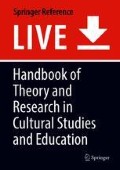Abstract
This chapter explores how writing centers can enact counter-hegemonic work through helping writers gain deeper understandings of contexts: audiences, writing situations, genre expectations, and power relations. It maps the position of writing centers, develops cultural studies for writing center work, and suggests strategies for writing coaches. Drawing theoretically on Stuart Hall, Lawrence Grossberg, Gilles Deleuze, Felix Guattari, and Antonio Gramsci, this chapter shows how coaches and writers can develop understandings of complexity, contingency, and contextuality. It then shows how these understandings can help coaches and writers map meanings; identify binaries, possible third positions, affordances, and constraints; and mapping political, economic, ideological, material, and social forces and structures. These techniques can help writers reflect critically on their use of genre and non-hegemonic codes, as well as recognize deeper complexities of writing situations and writing topics.
References
Barthes, R. (1991). Mythologies. New York: Noonday.
Bawarshi, A., & Pelkowski, S. (1999). Postcolonialism and the idea of a writing center. The Writing Center Journal, 19(2), 41–58.
Berlin, J. (1992). Poststructuralism, cultural studies, and the composition classroom: Postmodern theory in practice. Rhetoric Review, 11(1), 16–33.
Brookfield, S. D. (2005). The power of critical theory for adult learning and teaching. New York: Open University Press.
Clarke, J., Hall, S., Jefferson, T., & Roberts, B. (1976). Subculture, cultures and class. In S. Hall & T. Jefferson (Eds.), Resistance through rituals: Youth subcultures in post-war Britain (pp. 9–79). London: Hutchinson.
Dabirimehr, A., & Fatmi, T. (2014). LACLAU and Mouffe’s theory of discourse. Journal of Novel Applied Sciences, 3(11), 1283–1287.
Deleuze, G., & Guattari, F. (1987). A thousand plateaus: Capitalism and schizophrenia. Minneapolis: University of Minnesota Press.
Drew, J. (1998). Cultural composition: Stuart Hall on ethnicity and the discursive turn. JAC: A Journal of Composition, 18(2), 171–196.
Frost, M., & Lynch, D. (Writers), & Lynch, D. (Director). (20 May 2017). Part 4 [Twin peaks: The return]. In Frost, Mark (Producer).
Gramsci, A. (2000). The Gramsci reader: Selected writings 1916–1935. New York: New York University Press.
Grimm, N. (1995). Making writing centers work: Literacy, institutional change, and student agency (Doctoral dissertation). Michigan Technological University, Houghton.
Grimm, N. (1996). The regulatory role of the writing center: Coming to terms with a loss of innocence. The Writing Center Journal, 17(1), 5–29.
Grimm, N. (1999). Good intentions: Writing center work for postmodern times. Portsmouth: Boynton/Cook Publishers.
Grossberg, L. (1992). We gotta get out of this place: Popular conservatism and postmodern culture. New York: Routledge.
Grossberg, L. (2018). What did you learn in school today? Unpublished manuscript.
Hall, S. (1973). Encoding and decoding in the television discourse. Birmingham: University of Birmingham.
Hall, S. (1985). Signification, representation, ideology: Althusser and the post-structuralist debates. Critical Studies in Mass Communication, 2(2), 91–114.
Hall, S. (1987). Minimal selves. In L. Appignanesi (Ed.), The real me: Postmodernism and the question of identity (pp. 44–46). London: Institute of Contemporary Arts.
Hall, S. (1998). Subjects in history: Making diasporic identities. In W. Lubiano (Ed.), The house that race built (pp. 289–300). New York: Vintage Books.
Hall, S. (2016). Cultural studies 1983: A theoretical history. London: Duke University Press.
Hall, S. (2017a). Familiar stranger: A life between two islands. London: Duke University Press.
Hall, S. (2017b). The fateful triangle: Race, ethnicity, nation. London: Harvard University Press.
Hall, S., Critcher, C., Jefferson, T., Clarke, J., & Roberts, B. (1982). Policing the crisis: Mugging, the state, and law and order. London: Macmillan Press.
Harris, M. (1992). Collaboration is not collaboration is not collaboration: Writing center tutorials vs. peer-response groups. College composition and communication, 43(3), 369–383.
Harris, M. (1995). Talking in the middle: Why writers need writing tutors. Writing Center Journal, 15(1), 27–42.
Hickey-Moody, A. C. (2009). Unimaginable bodies: Intellectual disability, performance and becomings. Rotterdam: Sense Publishers.
Inoue, A. B. (2015). Antiracist writing assessment ecologies: Teaching and assessing writing for a socially just future. Anderson: Parlor Press.
Laclau, E., & Mouffe, C. (2001). Hegemony and socialist strategy: Towards a radical democratic politics. New York: Verso.
Mackiewicz, J., & Thompson, I. K. (2015). Talk about writing: The tutoring strategies of experienced writing center tutors. New York: Routledge.
McRobbie, A. (1980). Settling accounts with subcultures: A feminist critique. Screen Education, 34, 37–49.
Morley, D., & Brunsdon, C. (1999). The nationwide television studies. London: Routledge.
Nakamaru, S. (2010). Theory in/to practice: A tale of two multilingual writers: A case-study approach to tutor education. The Writing Center Journal, 30(2), 100–123.
North, S. (1984). The idea of a writing center. College English, 46(5), 433–446.
Single, P. B. (2010). Demystifying dissertation writing: A streamlined process from choice of topic to final text. Sterling: Stylus.
Slack, J. D. (2016). Articulation theory. In K. B. Jensen, E. W. Rothenbuhler, J. D. Pooley, & R. T. Craig (Eds.), The international encyclopedia of communication theory and philosophy. Chichester: Wiley. https://doi.org/10.1002/9781118766804.wbiect177.
Sunstein, B. (1998). Moveable feasts, liminal spaces: Writing centers and the state in in-betweenness. The Writing Center Journal, 18(2), 7–26.
Traber, D. (2001). L.A.’s “white minority”: Punk and the contradictions of self-marginalization. Cultural Critique, 48, 30–64.
Urion, M. V. (1998). Becoming most fully ourselves: Gender, voice, and ritual in dissertations. Unpublished doctoral dissertation, Michigan Technological University, Houghton.
Warnock, T., & Warnock, J. (1984). Liberatory writing centers: Restoring authority to writers. In G. Olson (Ed.), Writing centers: Theory and administration (pp. 16–23). Urbana: National Council of Teachers of English.
Young, V. (2011). Should writers use they own English? In L. Greenfield & R. Karen (Eds.), Writing centers and the new racism (pp. 61–72). Logan: Utah State University Press.
Author information
Authors and Affiliations
Corresponding author
Editor information
Editors and Affiliations
Rights and permissions
Copyright information
© 2019 Springer Nature Switzerland AG
About this entry
Cite this entry
De Herder, W.E. (2019). Cultural Studies in the Writing Center. In: Trifonas, P. (eds) Handbook of Theory and Research in Cultural Studies and Education. Springer International Handbooks of Education. Springer, Cham. https://doi.org/10.1007/978-3-030-01426-1_45-1
Download citation
DOI: https://doi.org/10.1007/978-3-030-01426-1_45-1
Received:
Accepted:
Published:
Publisher Name: Springer, Cham
Print ISBN: 978-3-030-01426-1
Online ISBN: 978-3-030-01426-1
eBook Packages: Springer Reference EducationReference Module Humanities and Social SciencesReference Module Education

